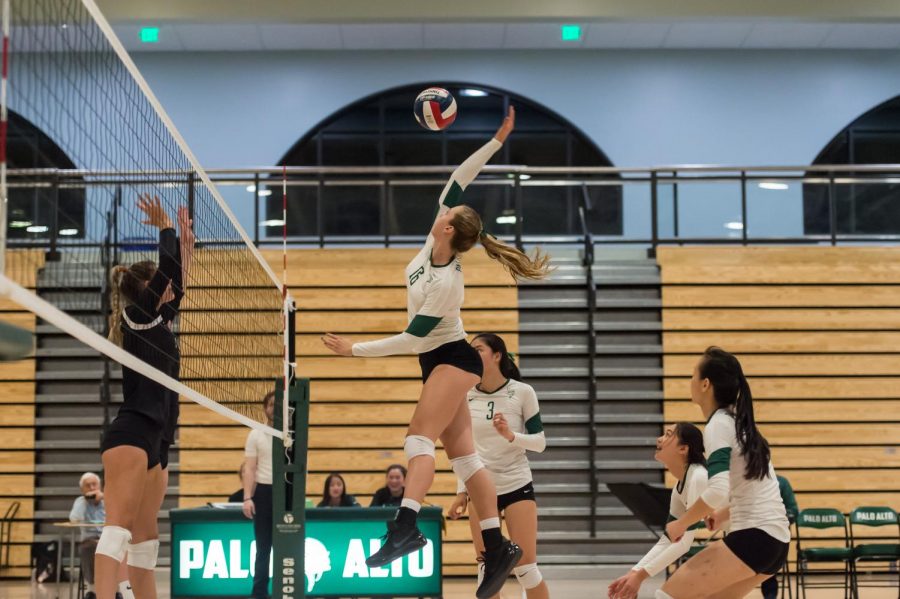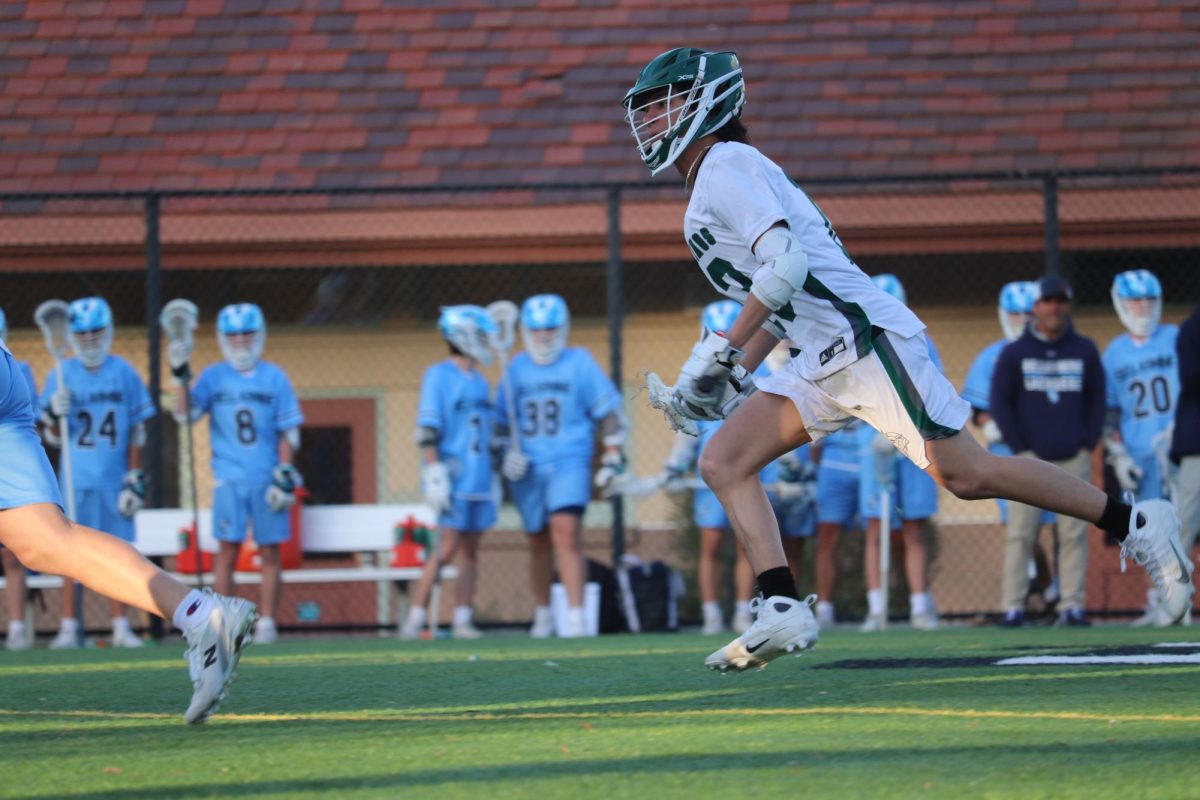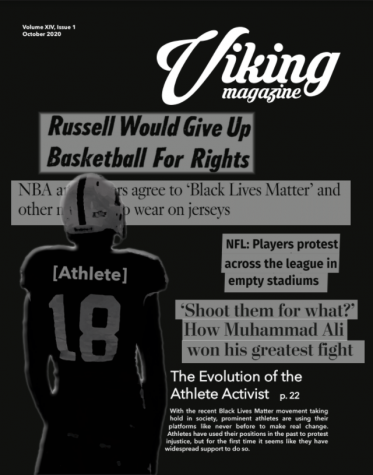Ball Player Brilliance
The media bestows a gross misrepresentation upon athletes, creating the false stereotype of them not being intelligent. Some athletes exhibit an alternate form of intelligence, which goes largely unappreciated by society.
January 28, 2019
Jamir Shepard (‘20) trots out of the huddle to his position out wide. His assignment is a post-corner option; a route where he is tasked with reading the safety and deciding to cut left or right down the field. In the seconds he has until the defense breaches the protective seal of the offensive line and forces the ball out of the quarterback’s hand, Shepard must make several reads and decisions. He bolts from the line of scrimmage, evading a weak attempt by the cornerback to jam him. As he progresses in his route, he recognizes the Cover 1 scheme the defense is employing, meaning man coverage across the board with a single safety left to protect a deep ball taking the top off of the defense. He sees this poor safety leaning towards the outside, and makes a gut choice to cut inside. He made the right choice. Leaving the safety in his dust, he explodes into the open space in front of him and catches a perfectly lobbed ball for a touchdown.
Shepard’s read was nothing short of genius. A combination of a high level of football knowledge and pure gut feeling led to six points for the Vikings. Shepard’s genius, however, goes largely unappreciated, like many athletes in this respect. Athletic ability, of course, is lauded profusely, but the minds of athletes fly under the radar.
Stereotypically, intelligence is measured by a combination of your grades, salary, score on the IQ test; some even factor in social prowess, or being “people smart”, into the overall intelligence of a person. Not usually factored in is the high level of intelligence shown on the field, such as Shepard’s impeccable reads of coverages. Why is this? Why does the brilliance of athletic IQ get skipped over in assessing someone’s intelligence?
The answer starts with pop culture.
It’s not difficult to imagine. A group of tall guys with big biceps and thick necks walk down the hallway, wearing varsity jackets and shoving the more vertically-challenged kids’ heads into lockers as they carefreely toss a football around the campus, which they act like they own. Any movie or television series with athletes, especially high school ones, have some version of this stereotypical cool teenage jock. Take cult classic Grease, for example. For those unfamiliar with the film, it focuses on a high school love between Danny Zuko and Sandy Dumbrowski. In typical high school athlete fashion, Danny, however athletic he may be, is impressively stupid, and he and his gang of fellow athletes are portrayed as the dumb, chest-puffing, too cool for school jocks that set the stereotype of the “dumb jock”.
In pop culture, jocks are portrayed as being unintelligent, short tempered and self centered which leads them to be seen as the “dumb kids” in the school, with their sole purpose of existence being competing in their sports. It’s a common scene to see a big crowd of buff jocks walking down the halls, plowing through anything or anyone that gets in their way, showing little respect to the people around them, who they deem inferior. By beating up random students who they believe are lesser or incompetent, they assert and maintain their rule of the school through the fear that they have inflicted throughout the student body, with nobody wanting or daring to challenge their authority.
This theme is seen throughout the pop cultures representation of athletes. The pressure of fitting into these set standards of being a jock and constantly maintaining the sense of competitiveness and superiority amongst peers has a negative influence on the jock. This sense of conformity is the main cause of individual jocks to act out and bully kids; it’s not that they personally have anything against these kids, but that they want to maintain their aggressiveness that they display on the field or court.
The way that media portrays jocks paints the picture in our head that every high school athlete is that same internally conflicted kid, with the incompetence to make rational decisions or exhibit a personality trait other than rage or arrogance, but in reality this is not the case for the majority of athletes.
Wilbur J. Bender knows something about the jock stereotype. A former Dean of Admissions at Harvard University, Bender was tasked with accepting only the most intelligent students into the university, in which he had to account all types of intelligence. “I don’t like the word jock,” Bender said. “It is unfair and unjustified. It implies thickheadedness and a segregated group of misfits, and improperly labels a lot of good people.”
Although the stereotype about jocks is that they are unintelligent, this vague generalization is inaccurate in a multitude of ways. Athletes, regardless of how they perform in the class, exhibit intelligence in a way that largely goes underappreciated. The media helps advance the false narrative that athletes only care about their respective sports – paying no mind to culture or school – rendering them stupid. This could not be further from the truth.
Take Kayvon Thibodeaux, for example. Thibodeaux is a current senior at Oaks Christian High School in Los Angeles, and according to website 247Sports, is the number one overall recruit in high school football. From a physical perspective, Thibodeaux certainly fits the bill for a stereotypical jock. Six foot two by age 12, Thibodeaux now towers at an intimidating six foot five, 235 pounds. His performance on the field certainly aids the case that jocks only care about sports, as Thibodeaux was a monster in 2017, accumulating an eye-opening 20 sacks in his junior year.
However, his genius doesn’t stop there. Thibodeaux is not just a football player, he is a bookworm, a chess player, and an aspiring lawyer who boasts a 3.8 GPA. He is also keenly aware of the political atmosphere we live in. Before every game, Thibodeaux takes a knee during the national anthem in protest of police brutality towards people of color.
Thibodeaux is aware, however, of the jock stereotype that follows him wherever he goes, which he detailed in an interview with news outlet Bleacher Report.
“I walk into a room, and people are automatically intimidated by me,” Thibodeaux said. “I’m 6’5, but I’m not some kind of monster. I’m not some crazy guy. I hit people on the football field, but I’m literally just a normal person. But everywhere I go, people just want to talk about how big I am.”
Paly has their own version of Kayvon Thibodeaux in Anthony Yu (‘20), who has felt similar types of stereotyping. Yu is a bona fide star on the court. An athletic specimen at six foot two and 180 pounds, Yu’s physique certainly caters to the jock stereotype. Similar to Thibodeaux, Yu notices that the stereotype remains attached to him. “Basketball is a huge part of my life. I’m always in the gym trying to get better, my Instagram posts are my basketball highlights, and I’m always thinking about basketball,” Yu said. “But it’s not my whole life. Anytime someone who I’m not really close to starts a conversation with me, it’s always about basketball. I’ve got other interests too, but people don’t see it like that.”
The same implied notion that Yu’s basketball career is his whole life doubles as the notion that athletes aren’t smart. The overarching stereotype around dumb jocks revolves around the fact that jocks only care about sports, which isn’t true. And even if it was true, as in some cases, in no way does that make the athlete any less intelligent.
Society, evidenced by the way our educational system is set up, mainly bases intelligence off of “school smartness.” Some athletes, however, possess an intelligence that goes beyond just school, which helps them outsmart their opponents. This special type of intelligence is referred to as sports IQ, or having a “feel for the game”, and this type of intelligence is rarely acknowledged by our society, even though it is vital for the success of athletes and equally as genius as someone who is a math wizard or a talented writer.
Sports IQ is a more abstract, complex subject than normal IQ. The best definition would be the ability to recognize and anticipate plays, patterns, actions, and situations at game-time speed and use them to heighten the chances of success. Often times in high school, players are able to get by on physicality alone, but smarter players who understand the game better are able to utilize their talent, usually the telltale characteristic that separates the good players from the great players, and the great players from the legends.
One such legend is Kobe Bryant. Bryant is most well known for being an NBA MVP, champion, and 18-time all star, but he also possesses a perfect demonstration of a heightened sports IQ. Bryant explained how he would spend some of the time that he wasn’t on the court reading over the rulebook and finding loopholes in the rules that he could exploit that gave him a significant advantage over his opponents. During one of his appearances on The Jimmy Kimmel Show Bryant said, “I read [the NBA referee rule book] to understand where [the refs] need to be in certain moments of time so if I needed to get away with a foul, I could.” Normally, when thinking of Bryant, one thinks about his raw athletic ability, his killer jumpshot, and his iconic dunks. Bryant, however, is also a player with a vaultingly high sports IQ and feel for the game, which goes predominantly unappreciated.
Although having a high knowledge of the game contributes to having a high sports IQ, anticipation is also needed for players to play the game in a smarter way. When watching some players it seems like they are always in the right place at the right time, intercepting a pass from the opposing team, knowing where the coverage is, or seeing a pass to make to a teammate before the run even happens. This is a prime example of the saying “work smarter not harder”, as the players can exert less energy due to the fact they already know where the ball is going. This allows players to conserve energy for later in the game, a further advantage from having a high sports IQ.
A perfect example of an efficient player such as this is none other than hometown star Klay Thompson. Thompson is most well known for his phenomenal accuracy as a shooter, but what goes unnoticed is his incredible anticipation and efficiency in order to be such a high scorer. Thompson’s efficiency prowess is perfectly epitomized by his game against the Milwaukee Bucks on December 5, 2016. Thompson was only on the floor for 29 minutes, far under the league average of 36 minutes for a starter such as Thompson. Thompson only took 11 dribbles the whole game, and was only in contact with the ball for 90 seconds. Logically, not being on the floor and not touching the ball basically at all is not a recipe for a large outburst of points scored, but Thompson finished the game with a spectacular 60 points, a record for a player who did not play 30 minutes. He accomplished his scoring feat through an incredible display of knowledge of the game rather than forcing up inefficient, low-percentage shots. Sportswriter Bruno Manrique summed up Thompson’s performance perfectly. “He wasn’t demanding the ball at the top of the key and forcing an isolation play,” Manrique wrote. “He did the dirty work of going between screens and losing his man to get open looks, or catch the ball at a great spot on the court to entice a foul.” Thompson’s implementation of his deep basketball understanding is what makes him able to efficiently and intelligently attack his opponents, leading to success for him and his team.
The final attribute that contributes to players having a high sports IQ is the ability to pick up on cues of their opponent and using these cues to read the opponent. From reading the positions of defense to find gaps in football, to quickly deciding whether you have enough time to shoot the ball before the defender closes out on you in basketball, the ability to think quickly at game speed with little hesitations is critical to an athlete’s success. Many college football fans remember the legendary ending to the 2018 College Football Playoff championship game, which ended in Alabama quarterback Tua Tagovailoa winning the game on a seemingly impossible 41-yard touchdown throw to wideout Devonta Smith at the end of overtime. What fans may have missed, however, are the scores of complex reads by both Tagovailoa and Smith that went into producing the touchdown. In post game interviews, the elated Tagovailoa and Smith explained their thought process during the play. “We called four verticals on that play,” Tagovailoa said. “After the sack, we just got up and took it to the next play. And throughout that process, we got the ball. It looked like they were running two trap. The corner trap on that single receiver side, and I held the safety in the middle as the over was coming. I looked back out, and he was wide open, Smitty was wide open.” Smith opened up on the reads on his end. “It was Cover 2, so I was really supposed to release outside, but the DB was so far outside I just attacked his left and slipped him inside,” Smith added. “And then when he threw it, I was like, ‘This is it right here.’” The complex reads and responses such as Tagovailoa holding off the safety with his eyes or Smith recognizing the misplaced coverage and changing his route accordingly perfectly showcase the intelligence of high IQ players and how it creates success for their team.
Those varying attributes constitute the backbone of what makes some players more intelligent on the field than others, and doubles as the factor that separates them from the pack of athletes with normal or low sports IQs. Regardless of whether or not athletes succeed in the classroom, this side of them, the one that isn’t appreciated, is a skill that not a lot of people have that should be more widely recognized as a form of intelligence. It’s unfair, and a furtherment of the dumb jock stereotype, to doubt someone solely due to their academic performance or social acceptance while completely disregarding their incredible intelligence between the lines.














